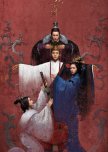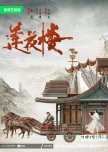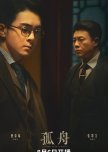
Secret of Three Kingdoms
23 oamenii au considerat această recenzie utilă
Sleeping with the enemy.
This drama weaves some of the most prominent historical figures of China's Three Kingdoms period into a fabulous and exciting tale of intrigue, adventure, and romance reminiscent of a Dumas plot. This is a highly fictionalized yet disarmingly convincing exploration of the motives and relationships of the key figures of the day that manages to stay broadly true to history.The last Han emperor has a secret that could shake the foundations of the empire and shatter his tenuous hold on power. Aided by a small intimate circle that includes the empress, his boyhood friend Sima Yi and a dwindling number of old Han ministers, he embarks on a desperate quest to escape the clutches of Cao Cao and restore the glory and power of the Han empire. But the cruel strategies and sacrifices needed are at odds with his benevolent nature and inclination to show mercy to his enemies. Ma Tianyu impressively pulls off a complex portrayal of this seemingly weak and powerless emperor who frustratingly sticks to his guns against all odds to ultimately succeed in winning the hearts and minds of his enemies with his enlightenment and magnanimity. It is very clear that the emperor and the notorious Cao Cao have very similar world visions and goals but their methods are extreme opposites - one rules by fear and sheer brute force while the other kills you with his kindness. Both are pragmatic and when the rubber meets the road, have little choice but to sleep with the enemy in order to achieve the outcomes they are after. We get to decide for ourselves who was more effective, who really won their epic struggle for power and whether it was worth it.
There are no real villains in this drama - even the emperor's enemies are portrayed in a very balanced manner though it is fair to say that the so called villains out-acted the heroes. Guo Jia is my favorite character in the drama - I often found myself rooting for him and oddly moved by his and Cao Cao's loyalty and affection for each other. And Tse Kwanho's Cao Cao must be by far the best Cao Cao I have ever seen - so cunning, powerful and menacing I was actually scared of him. Some of the most gripping and intense scenes in this drama are when Cao Cao and the emperor go toe to toe. My one big criticism of this drama is Han Dongjun's Sima Yi is shallow, boastful and unemphatic. For a highly rated actor to miss the mark on such a key character is just not acceptable. While some of the bromance moments with the emperor are decent, most of the time he is not in character and does not convincingly pull off the legendary strategist. Cao Pi is also extremely well acted but overshadowed by all the other outstanding performances. There is quite a bit of sizzling romance this drama, notably that of the emperor and empress as well as Guo Jia's but Sima Yi's was just kind of flat.
This drama is full of suspenseful moments and action as danger lurks around every corner. The second arc however is a bit draggy and requires some suspension of disbelief but that is also where the awesome Guo Jia emerges so don't abandon it there.
I will stop here and keep this short as it would be a crying shame to spoil this one. I highly recommend this very enjoyable and under appreciated drama that I would rate higher if not for Sima Yi
Considerați utilă această recenzie?

The Lotus Casebook
45 oamenii au considerat această recenzie utilă
Ask me no questions, and I'll tell you no lies.
Mysterious Lotus Casebook is a dark 江湖/jiānghú story about the ultimately futile aspirations and obsessions of the martial world. In an epic battle for supremacy, Di Feisheng of the dark Jinyuan Alliance challenges Li Xiangyi, the leader of the righteous Sigu sect. Both men disappear from the martial world afterwards, leaving a vacuum at the top and their sects in disarray.Ten years later, aspiring young detective Fang Duobing comes across Li Lianhua, a famous itinerant doctor whom he is convinced is a quack. Determined to expose him, he attaches himself to Li Lianhua as inextricably as a wad of chewing gum in his hair. They run into Di Feisheng, who immediately recognises in him his old nemesis Li Xiangyi. The two old rivals remorselessly keep Fang Duobing in the dark as they try to figure out who sabotaged their fight and search for Li Xiangyi's deceased sect brother Shan Gudao's corpse. An unlikely friendship develops as they work together to solve a series of strangely connected jiānghú cases.
Plot wise, this drama is solid but dry and unremarkable. The cases all unfold at a fast pace and are easy to follow, but do not engage audience participation. They are simply plants for clues to a treasure hunt for artefacts that unlock the main conspiracy. Despite a hint of the supernatural, the cases fall short of chilling or suspenseful. The hidden mastermind behind the main conspiracy is pretty obvious and revealed fairly early on, and even the ironic twist at the end is not much of a surprise. Both villains are one-dimensional jiānghú archetypes driven by vanity and delusions of grandeur. Wang Herun's scarily convincing portrayal of the Saintess of the insane cackle elevated the role beyond its one-dimensional character blueprint.
\What makes this drama a success are fascinating main character designs, strong rapport among the three leads, the scintillating dialogues, and well-choreographed and exciting action sequences. The real mystery is about who Li Xiangyi was and why he was killed. The answers are at surface trivial. Li Xiangyi was perched at the top of the martial arts world as the world's best swordsman and leader of the righteous sects. This made him the envy and natural target of virtually everyone. However, Li Xiangyi was far from the perfect hero of Fang Doubing's idealistic imagination. In fact, he was a self-absorbed, pompous ass who believed the universe revolved around him and his worldview. His swordsmanship is matched by a brilliant, cynical mind and a razor-sharp tongue that, according to poor Ai'man, can slay a person with a few words. If there is one thing lacking in Cheng Yi's otherwise stellar performance, it is that his Xiangyi is too empathetic. This masks his many flaws and hides how insufferable and difficult he was as a person. It took me awhile to realise that his sect had some inkling who Li Lianhua really was but they refused to recognise him because they just did not want Li Xiangyi to come back.
As for Li Lianhua, he is just a shard, a detached, sickly, disillusioned and world-weary remnant of the glorious Li Xiangyi. Cheng Yi really compels with his heart rending expression of this facet of the character singing his swan song without a shred of self pity. I lived for the sudden bursts of energy or sheer willpower that momentarily revives the breathtaking, dazzling and dizzying swordsmanship that propelled Li Xiangyi to dominate wuling. Only to all too rapidly diminish back into Li Lianhua again, a wickedly unapolagetic compulsive liar whose mantra is clearly, "Ask me no questions, and I'll tell you no lies." This is how he keeps everyone, and especially the hapless Fang Doubing, at arm's length; to avoid new personal entanglements. Fang Doubing (which literally means "sickly") is a parody character, the typical naive, high-minded, young adventurer raring to make a difference in the martial world. The dialogue is well written and humorously illustrates how grudgingly Li Lianhua is moved by this pesty young detective and tacitly accepts him as his successor. However, this kind of clichéd relationship dynamic of the clueless sidekick that elevates the brilliant sleuth is too common and quickly becomes boring. Li Lianhua's lies to Fang Doubing went on for too long to the point it became cruel and unnecessary. Their relationship is over explored and shortchanges the more interesting relationship in the drama.
What disappoints me most is that the writers opted to very cursorily explore the more complex and interesting relationship between Di Feisheng and Li Lianhua. Di Feisheng is the most layered villain in this story; that rare antagonist who transforms into a protagonist. Like Li Xiangyi, he rises to the top of his sect through sheer martial prowess rather than by winning hearts and minds. They are enemies who become friends, both betrayed and searching for answers. But his story is sidelined for much of the drama, his backstory is rushed, and his relationship with Li Lianhua does not really get a chance to develop and grow. Yet the best moments of this drama, are when all three of them are together, like a found family.
I like that this ends with an action-packed finale and satisfying final confrontations with the antagonists. But as for the plot, the best reveal is when Fang Doubing figures out who Li Lianhua is, which isn't really a revelation to the viewer. And I can't really pinpoint when the plot reaches its climax, as none of the high points make a strong impression. As for the ending, it is fitting but not as definitive as I would have liked. Most of Li Lianhua's journey is about putting his affairs in order and offering closure to those he cared for; to help them move on from Li Xiangyi who in all the ways that mattered died ten years ago. Yet Li Lianhua continues to string poor Fang Doubing (and us) along, which is too cruel and inconsistent with the drama's core message about letting go of past attachments and moving on. These kinds of endings that try to please all audiences really annoy me. I still enjoyed this superbly well written drama, immensely even though I think it had the potential to be much better. For me, this is an excellent 8.5/10.0 and a highly recommended watch.
Considerați utilă această recenzie?

The Fog of Suzhou
15 oamenii au considerat această recenzie utilă
Strong on character but short on plot.
A Lonely Hero's Journey is about a young man's brave and lonely resistance to Japanese occupation. It is set in Suzhuo in 1941, just four years before Japanese forces withdrew from China. At the time, Suzhuo was administered by the Wang Puppet Regime; which was formed by a faction of the KMT that defected to the Japanese. The Wang Regime called themselves peace seekers and didn't have much authority but are regarded as traitors in history. While Suzhou was not the epicenter of resistance against the Japanese, it is a gorgeous and culturally significant historical city in China. This drama highlights the scenery, architecture and culture of Suzhou, including authentic famous Suzhou ballads. Its not your typical highly trained spy vs spy espionage story but rather about the defiance of ordinary people.Gu Yizhong is a Western educated architect and the young master of the prominent and patriotic Gu family in Suzhou. On a rescue operation went awry, he gets framed as a Japanese traitor and is isolated and condemned by friends and family. He infiltrates the Suzhuo Secret Service station run by Zhou Zhifei to find out who the real traitor Cell 8 is. Zhifei of course knows who the real Cell 8 is and doesn't trust him for one moment. Zhifei and Yizhong are parallel characters that at a high level, share a common hatred for the Japanese. As individuals they are pushed to make difficult choices at pivotal moments of their lives. To survive they both have to be flexible; sacrificing a father, or a a son and their first love. Somewhere along the way Zhifei lost himself and became corrupt whereas Yizhong manages to hold on to his beliefs. In Yizhong, Zhifei sees the better man that he could have been but is not. In the guise of a mentor, Zifei goes after him like he is exorcising a ghost; destroying all that Yizhong values to bring about his moral downfall. Zhang Songwen is compelling as this selfish, dark and diabolical character, who occasionally allows glimpses of his lost humanity to shine through in his dealings with the two women he loves, his son and his mentor Mr Li.
This drama is very well cast and in addition to Zhang Songwen, is anchored by impressive portrayals by veteran actors Zhang Fengyi and Zhang Yao. In fact I think Zhang Fengyi's Gu Xixing stole the show. The drama starts to go downhill when Xixing exits and completely falls apart after Ou Xinping exits. The younger cast also delivers credible performances against the older actors. At times, Zeng Shunxi's portrayal lacks intensity and could be nuanced with inner conflict when it comes to how he feels about Haimo and Ruotong. Instead, he gives us nothing there so the way they ended left me scratching my head.
One of the best features of this story is how strong all of the women are in their own ways. Ou Xinping is not just a survivor, she is a killer with immovable convictions. Zhang Haimo is cool headed and calm, someone who is motivated by personal connections and loyalty rather than ideology. Unfortunately Haimo's character is destroyed after her walk away is walked back almost as an after thought to try to salvage the shipwreck of a storyline. This is Chen Duling's best role to date and I must commend her effort in even matching the lip movements of the very hard to sing Suzhou ballads. At sharp contrast is the passionate Xiao Ruotong who is far more emotional and willing to sacrifice for her ideals. Wang Yuwen's acting feels very genuine, evoking a moving picture of a young girl somewhat overwhelmed by the tide of history.
Despite wholehearted performances from the cast, this drama is strong on character but short on plot. The plot arcs lack logic and don't hold up well against close scrutiny. It is debatable whether Yizhong needed to make such immense sacrifices to isolate himself as a lonely boat that infiltrates the Suzou Bureau. His codename 孤舟/Gū Zhōu or Lonely Boat is too close a homonym to his surname Gù/顾 he may as well advertise that he is the CPC spy. The identity of Cell 8 is too obvious, diminishing the sense of suspense and is uncovered without much help from him. I was ready to fling my wine at the TV when the enemy simply allows Yizhong to walk away with the only key piece of military intelligence he obtained because he shamed his country for occupying China! After Japan lost WW2, it was absurd that Zhifei still stuck around simply to try to frame Yizhong rather than fleeing like the rat he is. But I guess in these kinds of stories the bad guy doesn't get to sail off into the sunset with his ill gotten gains. This is one of those dramas that can only be enjoyed if you watch the character stories and completely turn off your brain when it comes to the plot.
Even though this starts well and the acting is good, it starts going downhill just before the halfway point. I can only recommend watching this if you are a fan of any of the main actors or if you are interested in Suzhou culture. If not, there are too many better Republican spy dramas out there with tight and suspenseful plots. My overall rating 6.5/10.0.
Considerați utilă această recenzie?

Soul searching.
This is an absorbing sci-fi suspense thriller built around themes relating to the immortality of the soul and its ability to reincarnate after death. The city's top prosecutor Liang Wen Chao (Chang Chen) takes on a high profile, inexplicable and grisly murder of a terminally ill tycoon. As Wen Chao examines the key suspects - the son, the young wife, the deceased ex-wife and the business partner, cutting edge technology and superstitious rituals intersect to further muddy waters already tainted by greed, love, hate, misplaced loyalty, revenge and man's futile quest for immortality.Without spoiling it, I think the whodunit aspect of it is quite well done from the way the suspicion shifts from one suspect to another until the impossible is eliminated down to what remains as the improbable truth. I did not completely buy into some of the motives of the key suspects and I was irritated by the over-acted supernatural twist that failed to deliver the chiller thriller effect it was striving for. As for the howdunit aspect I will just say it was much more fiction than science but this is the case with most sci-fi thrillers. Since it does deliver an interesting twist, it is very forgivable so just go along with it and suspend disbelief.
This movie's strongest selling point is Chang Chen and Janine Chang's performance as the core investigative team and lead couple. The kind of stoic, desperate soldiering on Chang Chen does as a terminally ill man desperate to do his best for A Bao and their unborn child with what little time he has left is heartbreaking and moving. This is really Chang Chen's best role in terms of how he conveys such deep emotions and soul searching with so few words and how his journey gives him unique insight into the victim. Beyond his incredible weight loss, I was also riveted by how effectively Chang Chen conveyed the impression of a man calling upon the last legs of his energy, whose mind is very much alive as his body fails. This is not a love story but because of amazing acting by the lead couple, I can see the depth and complexity of their unspoken emotions, how well they just fit together, understand and sacrifice for each other. This is the part of the movie that will stay with me.
Considerați utilă această recenzie?

A kiss is just a kiss.
This drama is set in 1949 during the prelude to the Communist Party of China's descent upon Shanghai the most strategic city in China at the time; which the nationalist Kuomintang had vowed to defend. The loss of Shanghai paved the way for the CPC to sweep into power and the rest is history. Given this backdrop, it is no surprise that this drama is often mischaracterized as a spy thriller. And certainly while espionage is a prominent feature, it is not at all what this drama is really about. It is much more a slice of life drama that explores the social economic challenges and shifting political ideologies that affects friends, families and lovers at this great inflection point in modern Chinese history.I normally heartily dislike dramas set in tumultuous times like this because one cannot realistically expect happy outcomes. So I put this off for the longest time even though I am a huge fan of Chen Kun. But to my surprise, I enjoyed this drama almost from start to finish. The drama deftly avoids being melodramatic or maudlin by telling the story as a witty and intelligent dark comedy; effectively masking the sad, somewhat cynical undertone. I laughed my head off at the comical antics of the flighty widow who tries to turn back time with her first true love, a married man who is clumsily both tempted and terrified by her. It was only much later that it struck me what an ironic and cruel trick fate played on them and their families. Beyond Chen Kun, this drama is well cast with actors with excellent comedic timing.
The newly widowed Huang Liwen (Wan Chen) encounters Qiao Zhicai by chance as they both return to Shanghai. Having just lost her husband, a communist agent, Liwen tries to stay connected to him or perhaps give meaning to her loss by embracing his cause. Qiao Zhicai on the other hand is a a street savvy rogue and a bit of the black sheep of his family who ably navigates through the hyperinflation and shortages during those chaotic times. Their antagonistic initial interactions and misunderstandings blossom into a touching friendship and they become increasingly entangled into each other's lives. Together they try to protect the work of Qiao Lijie, Zicai's identical younger twin and a brilliant nuclear physicist. Their activities invite the scrutiny of the brutal secret police, putting them and their families in harm's way.
Where this drama shines is in its satirical portrayal how the main characters respond to provocation, conflict and deprivation. On the one hand, the drama mockingly lays bare the shallower, superficial and baser human traits of many of the characters and then redeems them by actions that also reveals their capacity for good. This darkly humorous depiction of familial bonds, sibling rivalry, love and betrayal as well as loyalty and friendship is vivid, hilarious and wistful. The overarching plot however will not satisfy true spy buffs although there are some thrilling, suspenseful moments and twists. It amounts to little more than a bunch of rather amateur spies pitted against a bunch of equally incompetent villains and making huge sacrifices for a mission that is ultimately of dubious historical significance.
I cannot praise Chen Kun's stellar performance in this drama enough. He pulled off both twins with such different personalities so convincingly I really believed there were two of them. Some of my favorite moments were when the brothers switch places - when Zhicai pretends to be Lijie he gives you the barest glimpse of Zhicai's concealed personality and vice versa. That is incredibly difficult to pull off and I don't believe I have ever seen it done better. I ended up loving both brothers and to me, Qiao Zhicai has become an all time favorite drama character. On the other hand, I found Wan Chen's Huang Liwen somewhat lacking. To be fair, it is a complex, messy role - a widow who is struggling to find meaning in her loss and existence. But she never convinces that her zeal for her cause is grander than love or friendship or even life itself. And she needs saving all the time. She only has three expressions - woebegone, helpless and cold. For her, a kiss is just a kiss; a means to an end with little true passion. I find her feelings for and attitude towards Zhicai unfathomable and frustrating. I don't think that is what the writers intended. Although she almost redeems herself at the end, I still find her unworthy of the sacrifices and risks Zhicai took for her.
For me this is an 8.5 that would have been a 9.0 if a better actress played Liwen. Nonetheless, I very much enjoyed the story and dark humor - it is very rare to see it done so well in c-drama. I can highly recommended watching this even though as a consequence, I suffered a major relapse and started cyber stalking Chen Kun again.
Considerați utilă această recenzie?

Novoland: Eagle Flag
18 oamenii au considerat această recenzie utilă
We are back!!! 铁甲依然在 (tie jia yi ran zai).
Novoland Eagle Flag is about a time in fantasy world Novoland's history where the outlawed Tianqu warriors are revived for an epic showdown with growing evil forces of the supernatural Chenyue cult.These are tumultous times in Novoland, where the ruling Yin Empire only has a tenuous grip on its power over its vassal kingdoms. The emperor and the ruling nobles of the various kingdoms are protected by their own armies led by skilled generals. By coalition and mutual self interest, an unstable balance of power is maintained. Internal politics and power struggles within the empire and the kingdoms complicate the plot. These sub threads are quite well written but can be ignored or followed loosely without losing track of the story-line. This inherent instability is manipulated by the Chenyue cult who preys on the superstitions, insecurities and ambitions of the ruling elite. As war breaks out when a powerful warlord seizes power, the might of the Chenyue's undead Redteeth army grows surreptitiously with the death count. This sets the stage for the return of the formidable Tianqu warriors, historical protectors of the realm until banished for killing a despot. Only the Tianqu warriors, lead by their chief suzerain with a legendary sword, had been able to suppress the Chenyue.
Our three main characters are destined to play a critical role in Tianqu's return. They are bound together by a touching friendship as they come of age during these troubled times. Asule is crown prince of the nomadic Qingyang tribe who are fierce warriors in the harsh wintry North. He is sent at young age to Eastland as a political hostage. Yuran is an orphan from the elite of the Winged Tribe who is a princess in name at the Xiatang court. Ji Ye is the unfavored elder son of a nobleman whese mother was a concubine. They were lonely children whose paths crossed in Xiatang and essentially become each others' families. Yet they are pawns in this ruthless world where their friendship is constantly tested by ambitious and powerful actors who use them to achieve their own agendas. Asule is an idealist who wants to use his power to save the world. Ji Ye wants to prove himself, he is a conqueror who wants to rule the world. Yuran doesn't care about the world or the future, she just lives in the moment for herself and her friends. The relationship between the three leads was one of the best parts of this drama and well written. They balance each other out perfectly. Asule is a gentle soul who cannot bear to kill even when it is the only way to achieve the greater good. Ji Ye has no such reservations but his ruthless ambition is checked by Asule's goodness. And Yuran is the glue that binds them together and keeps them grounded on what is truly important - their friendship and the importance living for oneself.
The cast was very strong as this big budget production spared no expense with veteran actors. Many did not like the actress Song Zuer but I thought she was the perfect Yuran, which is not a deep character, just a very vehement one. While Liu Haoran did a good job portraying Asule, the character was poorly written and waffled in the back half. Don't hold it against him that the scriptwriter turned him into a brainless incredible hulk-like killing machine whenever he is angry. And while Chen Ruoxuan overdid the petulant youth in the beginning, Ji Ye's character is a strong one that showed tremendous growth towards the end.
The script-writing which was fantastic and gripping in the first half turned into an epic disappointment in the back half. It became repetitive, deviated into half heart-ed ill fated romantic tropes and took odd and messy turns with several core characters including Asule. I realized too late that this is the same dastardly Linmon Pictures that similarly destroyed the back half of Legend of Fuyao. It is their signature gimmick of replacing the production team with Team B so that Team A gets to move onto new projects. At that point you are so invested that you end up watching the rest of it anyway. The only thing that helped Novoland is that it is backed by the substance of a real book whereas Fuyao descended into 100 pct script-writer induced train-wreck. Given the record budget, the popularity of the novel, serious hype and the veteren cast this should have been a 9 or 10, one of the best of the year. What an epic let down - despite some truly superb battle scenes and cinematography, it ended up as just an OK overall production due to the messy writing.
The ending is controversial and felt rushed. Unlike most, I believe the Eagle Flag chapter of Novoland ended where it should have. One of the biggest misconceptions of this drama is that the story is character driven. It is not. The three leads may have their own subplots but all of the plot threads converge in the final conflict between Tianqu and Chenyue. The characters are relevant only as far as their roles in the build up to an epic climatic clash between good and evil. What happens to the characters after that is not important since the story is not really about them. A sequel or season 2 seems unlikely in this context although there could be spin offs that once again touch upon some of their subsequent paths - someone who read the books will know better than I.
Considerați utilă această recenzie?

Nirvana in Fire
34 oamenii au considerat această recenzie utilă
This is like a fine dining experience - to be savored and remembered. It deserves an 11/10.
Nirvana in Fire is an exceptional drama by any and all standards - nothing else I have watched comes even close to surpassing it. It truly checks all of the boxes in terms of a complex plot, an incredibly talented cast, excellent screenplay, well executed action scenes and overall movie-like visual impact and production quality.This is the story of Lin Shu's single minded quest for justice and reform. His father, a powerful general in command of the 70,000 strong Chiyan army is framed as a traitor while away defending the Liang state. Victorious but battle worn, he is slaughtered along with his entire army before they have a chance to return to the capital. Young Lin Shu barely survives and re-emerges 12 years later as Mei Changsu, the mysterious leader of the powerful pugilist Jiangzuo Alliance. His appearance is completely altered and he is a sickly, shadow of the vigorous young warrior he used to be. He returns to the capital amidst a power struggle between the crown prince and his brother Prince Yu as the Divine Talent, a brilliant strategist regarded as an emperor maker. He plays them against each other and is on surface allied with Prince Yu while he surreptitiously advances the out of favor Prince Jing. The complexity in the plot arises in the brilliant and occasionally cruel strategies he employs to uncover the full extent of the conspiracy and all those complicit in his family's murder as well as to advance Prince Jing's position. This is not a story about revenge, it is about justice. It is also about reform as justice is worthless without reform. Making abiding changes to the court and the system that would be overseen by a just and moral ruler was an equally important outcome to Lin Shu/Mei Changsu. To achieve his mission, he had to do many things he considered despicable. Cleaning out the corruption in the court was the only thing he could do to make the senseless massacre of his family and comrades in arms mean something.
This is an impossible show to binge watch - I can at best get through two episodes in one sitting. We learn from the get go that Lin Shu is living on borrowed time. That imbues the drama with an omnipresent sense of sorrow and inevitability that grows as it steadily progresses towards the end. Whenever the mood gets unbearably heavy, there are welcome moments of brilliantly timed comic relief. The first episode is probably the most difficult to follow as most of the key characters are introduced all at once .Thankfully there are many excellent character guides online that are super helpful in the beginning. There are no unnecessary characters in this show; each one was brilliantly cast and has an important role in the unfolding storyline.
The role of Lin Shu/Mei Changsu is a complex one and not at all easy to play. This was without a doubt Hu Ge's defining role and he just killed it. Time and again he was able to subtly convey a multitude of intense emotions behind a superficially stoic expression. As Mei Changsu the strategist, he was brilliant, ruthless, calculating, Machiavelli and breathtakingly cruel when necessary while battling his self-loathing for the person he was forced to become. He is filled with longing, regret and fear of discovery as he re-encounters his former love, friends and relatives under this new identity. He masterfully portrays a callous indifference that masks unbearable hurt as his actions and morals are misunderstood by his best loved friend. As they inevitably begin to recognize his old mannerisms and think the unthinkable, he cannot help but tease them with the truth before skillfully evading their suspicions. The chemistry between Lin Shu/Mei Changsu and the rest of the cast and in particular Prince Jing (Wang Kai) is mesmerizing. Twelve years later Prince Jing still misses Lin Shu, his boyhood friend and cousin and was never quite convinced the Lin family could be guilty of treason. Despite his contempt for Mei Changsu's lack of moral scruple, the principled Prince Jing's soul knows him and he is eventually drawn into a strong and touching bromance with him . Equally moving were the rare smiles, flashes of humor and fatherly affection that emerges when Lin Shu/Mei Changsu teases Fei Liu, his lethally skilled and fiercely loyal boy protector. Despite his crushing physical weakness, he desperately lies to shield his loved ones from the extent of his suffering and true condition. I found myself grieving for not only the lost friendships and love affair that could have been but for the Lin Shu that Mei Changsu can never become again.
The character development in this drama is so sophisticated and multi-layered that even the worst villains of the piece are to evoke a sense of pity for their human failings and have some redeeming aspects. The story builds towards an epic climax that sees Lin Shu/Mei Changsu confront the person ultimately responsible for this terrible and unforgiveable betrayal. Both actors in this final showdown were phenomenal but I think the tyrant's rant from rage,to hubris, to denial, to defeat , to defiance and then finally to almost but not quite remorse truly blew me away. It is in this encounter that Lin Shu delivers his most excoriating, most tragic and and most damning indictment -"If you knew your son you would never believe he could betray you. If your son knew you, he would not have refused to believe you betrayed him." The script writing is powerful and we are treated to many emotionallly loaded lines but for me, this one was the one that summed up the root of the tragedy and made me weep for both of them. But Lin Shu/Mei Changsu was beyond tears. It is this ability to convey bottomless sorrow without shedding a tear that made this Hu Ge's unparalleled performance.
{Warning - Spoiler ahead]
I love it that this show pretty much ends after the climatic peak with most of the loose ends tied up well ahead. Even though we know from the very beginning that Lin Shu/Mei Changsu dies, it still broke my heart. Nonetheless, the drama comes to a very fitting and satisfying end. While this was an enthralling, immersive journey from start to finish, I think I need to take a break with something less intense. I suspect this will remain the very best drama I have ever seen for a long time although I still love Ten Miles of Peach Blossoms best.
Considerați utilă această recenzie?

Demon in red.
Zhao Yao is a fun fantasy love xanxia drama where both leads belong to the dark or demon sect. The unconventional "good vs evil" plot challenges the idea of what is "good" and what is "evil" as the good guys are really the bad guys in this drama. The best thing about this drama is the sizzling chemistry between the two leads. What totally really drags it down is that it is littered with fillers - it should at best a 30-40 episode drama. That made me grumpy and is the main reason for the less high rating.Zhaoyao (Bai Lu) the female lead is an unapologetic bad-ass she devil who falls for the Demon King's son Moqing/Li Chenlan (Xu Kai). Li Chenlan is imprisoned by his father until he can free him from the powerful evil demon force within him. Zhaoyao is raised in solitude by her grandfather; it is their sacred duty to guard Chenlan until the Demon King returns. Led by the powerful immortal Luo Mingxuan, the righteous sects decide to preemptively kill Chenlan before he can wreak devastation on the world. Instead, they accidentally free Chenlan and an injured Mingxuan is rescued by Zhaoyao, who becomes infatuated by his chivalry and righteousness. She is outraged when she discovers his plans to kill Chenlan and boldly rescues him, earning his undying love in the process. She is captured and tortured by the thwarted Mingxuan and her freedom comes at a devastating personal price. Enraged and disillusioned, Zhaoyao forms and builds up her own formidable Wanlu Sect that wreaks havoc on Mingxuan and his "righteous" sects and protects those persecuted by them.
While recovering a legendary sword, Chenlan accidentally releases a deadly force that kills Zhaoyao. Boy is she pissed!!! She returns as an angry, vengeful but much weakened spirit that is hell bent on killing Chenlan dead. By then, Chenlan is practically invincible and it further incenses her to discover he has taken over as the leader of the Wanlu sect. This man enjoys living dangerously - he is so besotted with Zhaoyao that he is amused by and even welcomes her efforts to alternately kill and/or seduce him. The best moments are all centered around their occasionally funny and wholly adorable interactions. He is totally putty in her hands and cannot deny even her most dangerous requests. The sparks literally fly between them and their body language and obvious affection for each other is mesmerizing. All the early to middle episodes of them falling in love were the best and totally re-watchable. Bai Lu's Zhaoyao is just simply phenomenal - she is fiery, fearless, impetuous, occasionally wicked and completely bewitching. She also really brings out the best in all of her co-stars. However, outside of Bai Lu and Xu Kai, the cast is rather dull and didn't to engage me. Two of the other main female characters have a tendency to wail, which always has me scrambling for the fast forward/mute button. Sigh! When will they get it that wailing, whiny and noisy female characters are a nuisance?
The second female lead in this drama plays Qin Zhiyan (Yan Xiao), whose body Zhaoyao shares in the first half of the show while she tries to reclaim her own. The two are polar opposites yet form a strong and cute friendship. I wasn't wowed by Yan Xiao's overall performance, she got too much airtime in the first 20+ episodes that her cuteness turned into boring/whiny. The editing is sloppy - it jumps ahead, flashes back and in some cases explains what happens much later. I would rewind thinking I missed something that gets explained much later on - like how Mingxuan was out of the blue in a sealed state by Zhaoyao. I have FOMO so I hate fast forwarding but there were too many flashbacks and boring conversations between the righteous sects. Both the female and male love rivals were total cliches - they each sought to win Chenlan/Zhaoyao's love by killing off their rival. Wow -such a time tested losing and deranged strategy. The other main antagonist Jiangwu was an immature and swaggering pest until he redeemed himself slightly at the end. There are also a bunch of forgettable side love stories. The pace overall is painfully slow.
This drama went downhill toward the end. It didn't help that they randomly (and unnecessarily) killed off secondary characters. The ending was a bit rushed, garbled, messily executed and a bit wishy-washy when it could have and should have finished very strong. What is truly baffling is the countless wasted filler moments that could have been cut so that the ending could have been done properly.
I still recommend this but wouldn't bother to watch the whole thing. It wouldn't be a bad idea to drop it after Zhaoyao and Chenlan get together somewhere in the early 40s. Fast forward with impunity every time one of the two excellent main leads is not on. I will be looking out for more dramas with them (together would be great) and especially Bai Lu.
Considerați utilă această recenzie?

Catch me if you can!
Thirteen Years of Dust is the best Light On/Mist Theatre suspense thriller iQiyi has released since The Bad Kids and The Long Night in 2020. This tightly written mystery cum police procedural is gripping from the start. An eerily staged crime scene reminds Lu Xingzhi of a serial killer that had terrorised Nandu thirteen years ago, when he was just a rookie detective. Starting with his mentor Wei Zhengrong, he gets the old investigative team that had profiled and hunted the killer back together again. They have unfinished business to get down to. Thus begins a thrilling chase for the long hidden killer who seems to be taunting them, "Catch me if you can!"The way the narrative unfolds in parallel between the present and the past is mesmerising and immediately made me invested in the main characters, including potential antagonists. In the present, the characters are older yet wear unmistakeable vestiges of the past that make them seem still touchingly familiar. We see what they were like juxtaposed against what they have become. This invokes a haunting sense of nostalgia over what was lost and what could have been. This captures the essence of what made CBS's Cold Case one of my favorite police procedural series. Wei Zhengrong seems the most markedly affected. In sharp contrast to the rather rough, dismissive, and bitingly cynical cop in his prime, he becomes a muted, wiser and oddly broken shadow of his former self. Lu Xingzhi on the other hand has delivered on his early promise and come into his own but his family life is disrupted.
Chen Jianbin and Chen Xiao anchor the stellar cast in this production. Both are charismatic and convincing actors with such incredible chemistry that it evolves to reflect the passage of time. They each subtly take on some of the other's traits thirteen years later, indicating how deeply they influenced one another. It is not easy to play characters that have aged and changed over thirteen years, yet remain essentially that character. Beyond both leads, every main character in each of the many cases delivers riveting portrayals of both their younger and older selves. This brought the victims to life through the eyes of people who knew them, loved them, feared them, envied them and may very well have killed them! The side story that moved me most was that of the gangster and the dancer.
The plot is very well designed and is a lot more whodunit than howdunit. It is set in a time when use of forensic technology was nascent and primitive. So the cases had to be approached the good old fashioned way of narrowing down suspects to who had motive, means and opportunity. The evidence and clues are all presented in an even handed manner; there is no attempt to hide anything from the viewer. From early on, the audience has enough clues to credibly build a case around at least two suspects at any given time. While the solution is not a huge surprise as the killer is well concealed but far from invisible, it still comes with a decent twist. It is a surprisingly dark story with a chilling ending for a c-drama. The production maintains an unsettling tension of a disturbing and menacing presence throughout. If I have to criticise, the staged crime scenes are a bit pretentious and the explanation of the painting and its significance is on the weak side although it just passes muster.
Overall, this is a well written and nicely executed crime thriller that will satisfy exacting crime buffs. A highly recommended watch that I rate 8.5/10.0.
Considerați utilă această recenzie?

Everybody lies.
This psychological suspense thriller featuring a female hardcore detective starts out well. Ran Dongdong investigates the death of Xia Bingqing, a young woman with secrets. To figure out what happened to her, Dongdong has to piece together who Bingqing was and why someone wanted her dead. As the list of suspects in this complicated murder case grows, it is clear that everybody lies whether they are doing it consciously or not. The way Dongdong nails down inconsistencies in the various testimonies by unreliable narrators and incisively teases out the truth is riveting.Work and life collide for Dongdong when it is discovered that her husband Mu Dafu crossed paths with the victim and he had twice rented a hotel room at the likely scene of the crime. She explores the complexity of love, marriage, and fidelity in both the work and personal arena and the lines start to blur. She begins to interrogate him like a suspect. In fact, he gets the worst of it because there are no professional restraints at home. Not that he is a paragon of virtue, far from it!! He was always a bit of a narcissist humanities professor that openly indulges in deeply intimate, highly flirtatious but ostensibly intellectual discussions with professional peers and students. She was fine with it until inexplicably, she is not. Likely because they fell out of the idealistic love phase of their relationship or maybe because he stopped telling her about these women that fall for him.
I did not expect to see this suspense plot devolve so deeply into a dark exploration of marriage between a dislikable and messed-up toxic couple. Both Song Jia and Wang Yang deliver mesmeric performances as flawed, complex, egotistical, and ultimately selfish characters. I did not like either of them. In fact, there are no heroes in this story. Other than the poor kid, pretty much everyone is a terrible person. Even the victim is too much of an architect of their own fate and is not empathetic. Neither of the two parallel plotlines is satisfactorily resolved. The whodunit mystery ends up being a howdunit procedural with too many plotholes and a weak, trite, cop-out motive for the murderer. The way the relationship is resolved also leaves unanswered questions although there is closure in the sense that Ran Dongdong and Mu Dafu really deserve each other. May they live tortuously ever after.
I enjoyed this drama up until episode 10 after which it turns into something I had no interest in watching. I can see how it may hold some appeal to people who like difficult relationship stories. My rating of 6.5 is for the very mediocre suspense plot, which is what I came to watch.
Considerați utilă această recenzie?

My Secret Roommate
17 oamenii au considerat această recenzie utilă
A wrinkle in time.
This is a surprisingly enjoyable short love story with a novel premise. He Zhengyu, a hot shot lawyer experiences a series of setbacks that lands him in a modest apartment. Every night, he is "haunted" by rookie reporter Chen Jialan, who occupied the apartment four months ago. A wrinkle in time brings them together each night at 10:06pm for 46 minutes. During this time they must solve a few cases that they were involved in professionally that may have set them on the road to perdition.The initial encounters between Zhengyu and Jialan are hilarious and intriguing as they both scare the hell out of each other. They had me rooting for them from the get go. But as their relationship progresses, I find Jialan remains too sweet, childish and cutesy. I expect to see their chemistry take on a more mature and adult tone later on but this doesn't quite happen. Nonetheless, I stayed invested in their story throughout and kept going even though the whole Jirong saga bored me to tears. I have not seen such bland and monotonous acting in a long time. It is almost criminal to pair up such an insipid actress with such a hot actor as Dai Gaozheng. The cast overall is not strong and it is Yang Xuwen's convincing and charismatic portrayal of Zhengyu and how he is changed by this wrinkle in time that elevates the main relationship and saves the entire drama.
The biggest plot hole in this story is He Zhengyu's lack of curiosity about who Chen Jialan was and why she vacated the apartment he moved into. You would think his first instinct would be to find out everything about her and to try to track her down. But no, he waits till very late in the game to do this. The cases are only mildly interesting and the villains are quite obvious. While the drama does a good job transitioning between the past and the present, the main characters traverse back and forth too often and too inconsequentially. The plot does become slightly convoluted towards the end, with too many twists. Despite some obvious flaws and plot holes, there are enough fresh and engaging moments that make this an entertaining watch. This is a 7.5/10.0 that will nicely tide over a dry spell.
Considerați utilă această recenzie?

The Advisors Alliance
20 oamenii au considerat această recenzie utilă
The king maker is king of kings.
Note: There are some statements of well known. historical facts in this review. They are by definition not spoilers but be warned in case you are unfamiliar with the history of this period.Sima Yi, courtesy name Zhongda. History's most cunning grifter, a man who stole a throne and an empire more than once! I always enjoy dramas like this because they bring larger than life historical characters to life and deflate them into close to normal human beings. I never imagined Sima Yi would be portrayed as such a timid, groveling, deceptively harmless and well, just ordinary fellow. Or that he would be so terrified of his wife. That just cracked me up. Audacious.... sacrilegious even.... love it!
The drama opens with Zhongda, a brilliant scholar and tactician, welcoming his firstborn son Sima Shi into the world. His father Sima Fang is a shrewd and influential minister of the Han Imperial Court. By then, warlord Cao Cao had already openly seized power and repeatedly bullies the Han Emperor into a sniveling, terrified puppet. Zhongda unwittingly catches the eye of Cao Cao as he deftly extricates his father from a dire situation. He goes to extreme lengths to avoid serving Cao Cao who is both keen to make use of his talent and wary of it at the same time. Recognizing his innate cunning and ambition, Cao Cao regards him suspiciously as a double edged sword and comes close to killing him dead many times.
Initially I was surprised and a little bit underwhelmed to see such a timid and groveling Sima Yi. But the layers peel away very satisfactorily to reveal his hidden ruthless nature, his scheming and bold ambition. He is a king maker, someone capable of securing the throne for Cao Pi, the less favored son against Cao Cao's own wishes. He then proceeds to steal an empire for Cao Pi but this part seems whitewashed. I doubt Liu Xie was really that eager to so simply hand over the throne. Not surprisingly, he also intervenes in Cao Pi's succession plans. At that point, it is clear that Sima Yi the king maker is king of kings; that three generations of Cao rulers' succession is determined by this man. Notwithstanding his many contributions, Sima Yi is portrayed as a selfish and cunning character who parleys his own interests ruthlessly. He manipulates two revered ministers into sacrificing themselves to ensure Cao Pi's ascension, but it is clear his primary motive is to save his brother's life.
Sima Yi's great rivalry with Yang Xiu is rivetingly played out in the bitter succession battle between Cao Pi the worthy son and Cao Zhi the favored son. Both are ambitious and brilliant tacticians but they couldn't be more different in nature. Yang Xiu is arrogant, outspoken and extremely intuitive. He cannot help showing off, often over estimating himself and underestimating his enemies. This cost him his life and Cao Zhi the throne his father so badly wanted to give him. In sharp contrast, Sima Yi avoids attention and while he is is often underestimated, he has a healthy respect for his enemies capabilities. His final conversation with Yang Xiu, someone he empathized with, respected and learned from as a worthy opponent illuminates how Sima Yi managed to hang on to his head through many dangers. I have not watched Wu Xiubo before and I was hesitant about him as he is not the image that jumps to mind when I imagine Sima Yi. My concerns faded almost immediately and I cannot think of a better actor to play the role of Sima Yi as characterised by this production.
This drama largely sticks to history in terms of the key events and leading characters of the day. Told chronologically, the drama unavoidably peaks with the exit of the veteran actors who also play the most interesting figures of the day. This drama's highlight for me was Xun Yu's (played by none other than the fabulous Wang Jin Song) opposition to Cao Cao's decision to form his own feudal state. Their bittersweet final exchange that touched upon their long friendship, mutual respect and alignment that turned into reproach and disappointment is a powerful, memorable and compellingly acted drama moment that only two actors of such caliber can deliver. I can recommend watching this drama for that scene alone. I feel pity for anyone attempting the role of Cao Cao after Yu Hewei. I almost wept with joy at the perfection of his rendering of Cao Cao in his twilight years; the ambitious warlord stymied by the limits of his own mortality and torn by his succession dilemma between his most worthy son and his most loved son. Needless to say he is as bad a dad as he was as good a warlord and statesman. Ironically, Cao Cao sows the seeds of the downfall of his own empire as Cao Pi is also a terrible father who also messes up his own heir. Whereas the Sima family in sharp contrast are paragons of Confucian family virtue, the foundation of a moral society.
When it comes to the inner palace and familial relationships, the storytelling embellishes wild history and heavily fictionalizes the historically insignificant aspects. I was sad but unsurprised to see Cao Pi's deep friendship with Zhongda become distrustful and utilitarian after he becomes emperor. While I understand the audience appeal, it is well known that Zhongda's relationship with his wife was much less cordial but I love Liu Tao and was happy to buy into this Disney version. However the whole song and dance with Lady Bai and how Zhongda was "forced" to accept her went too far and just made me roll my eyes. I expect a man of that status in those times to have concubines I don't see the need to waste so much time suggesting he meant to be monogamous when he definitely was not. I also was not compelled by the chemistry between Cao Pi and Lady Guo but at least they didn't try to suggest he didn't have a harem. Lady Zhen's story could well just be speculative history but she is the character I felt the most sorry for in this drama.
The Advisors Alliance is the first instalment of Sima Yi's story and ends with Sima Yi retiring from active duty under Cao Pi. By then, Sima Yi and his proteges had succeeded in pushing through agricultural and structural reforms that made Cao Wei great and restrained the power of the Cao clan warlords. It is a fascinating account of how an understated and often under estimated Sima Yi was ruler in deed if not in name. His machinations paved the way for the Sima clan's rise in influence which eventually led to the founding of the Jin dynasty, which many still argue was not a legitimate state. I enjoyed this enough to rate it an 8.5 and will probably go on to watch the second season Growling Tiger, Roaring Dragon which focuses on his rivalry with Zhuge Liang.
Considerați utilă această recenzie?

Junk food with no calories: highly addictive and binge-worthy.
This is THE drama that revived my love for Chinese costume drama. I was hopelessly addicted and inconsolable after it ended. I hungered for the next Ten Miles of Peach Blossoms and was crushed and then frustrated when I realized there is nothing else like it. I still have to restrain myself from binge re-watching my favorite parts. My conscience always struggles with inflicting this on someone else so be warned: TMOPB will connect with you and compel you to fall in love with it but it will also ruin everything else you for a long time.At its heart, this drama very simply an intense, fantasy love fairy tale that spans three lives and three worlds. The plot is not complex, the CGI and some of the fight scenes are not the best and there are small holes and loose threads but nothing diminishes the utterly spell-blinding love story between Bai Qian (Yang Mi) and Ye Hua (Mark Chao).
In the first part of the story, Bai Qian is disguised as a boy Si Yin, the best loved disciple of Mo Yuan (also Mark Chao), the God of War. The young Bai Qian/Si Yin is a carefree, mischievous and indifferent student. A terrible betrayal by her first love that leads to a devastating war and the sacrifice of her beloved sifu Mo Yuan’s soul leaves Si Yin inconsolable with grief and remorse. If Bai Qian occasionally comes across as dislike-able, it is because Yang Mi did not successfully convey how deeply and utterly wounded Si Yin/Bai Qian was by these events. This transformed her into an aloof, cynical and outwardly cold goddess who closely guards her innately warm and loyal heart.
As for the Ye Hua character, part of his magic is there is no such thing as a Ye Hua - he is the brilliant, invincible and handsome Crown Prince of the powerful Celestial Tribe. He is also a great cook, a wonderful father and he loves only once and unconditionally. But underneath that too good to be true surface, he has his own glaring flaws. His first hopeless love is Susu, a lonely, kind heart-ed, docile mortal woman he meets on a chance encounter. It is an unequal relationship that was doomed to end in tears. As a result of his inexperience and hubris, he makes many miscalculations and ultimately betrays her in a way that tragically ends their relationship. He mourns her and waits for her return for hundreds of years and against all logic and odds. When he discovers Susu and Bai Qian are one and the same, he is elated and goes to extreme lengths to crack the ice around her heart and win her love and forgiveness. But Bai Qian is a much older and complicated woman who is initially dismissive of his puppy love. She is a high goddess and a queen and thus more than his equal. While he was thrilled by this spicier version of Susu, he finds to his frustration and fear that she has a past and her heart is not as easily won.
Mark Chao’s Ye Hua will forever be the defining Ye Hua. It doesn’t hurt that this dude has the best eye ogling motion and is capable of the most unbelievable micro facial expressions. He is not afraid to look ugly when he is terrified or devastated with grief. As Susu’s Ye Hua, he is the austere young prince who discovers love and happiness for the first time. As Bai Qian’s Ye Hua he is darker, more passionate, more aggressive and much wiser. Chao's Ye Hua literally gets better looking as the drama advances. Its an illusion that arises as he compels you with the many faces of Ye Hua; the serious and dutiful prince, the valiant warrior, the besotted bridegroom,the grieving widower, the protective father, the frustrated lover... He is equally persuasive as the stoic Mo Yuan who silently mourns the love he lost while he was recovering from saving the world.
Yang Mi and Mark Chao together are a heady, addictive combination. They are both so gorgeous that it is just a gigantic eye candy feast. This drama unabashedly spams you with steamy scenes of the two of them kissing and rolling around in bed. I suspect Mark Chao was cast as Ye Hua based solely on how shockingly good he looks lying down and his terrific acting skills were just an accidental happy bonus. Their chemistry gets noticeably more intense and you to fall in love with them falling in love. In lighter moments, the dialogue is both hilarious and touching. As a couple they subtly mock many cliche costume drama stereotypes – Ye Hua is the cook, he is Mr Mom, he cross dresses and he turns on the waterworks more easily. She is a much older woman who can drink him under the table, proposes to him and likes to lecture him. While the drama is sloppy elsewhere, Ye Hua and Bai Qian’s scenes are shot with meticulous, loving attention to detail. In each life, they hold each other the same but slightly different way when they sleep, she combs his hair the same but slightly less loving way, and when Bai Qian hugs Ye Hua the way Susu hugged him you just KNOW he has almost wormed his way back into her heart.
All of the emotionally moving scenes are accompanied by one of the four haunting love songs from the OST. The production team had a cheeky sense of humor when it came to Ye Hua’s costumes - they sneaked in a number of really sidesplitting outfits. In the memorable episode when he meets Bai Qian for the first time, he looks like Big Bird in a black feather outfit that highlights his beaky side profile in not the best way. By then, I was so smitten that the thinking part of my brain barely processes this. And then there is the cross dressing.… In most of the love scenes, Ye Hua borrowed my pajamas and copied my hairstyle. I can't explain how I am not bothered that he had the audacity to look so delicious in my nightgown. At the end he even pulls off this black with pink peach blossom flower print dress that I have aptly named Su Jin’s Revenge. None of it matters - he can speak the cheesiest lines, cry, cross dress and still come across as this crazily sexy, hot man beast. Love is blind indeed.
The strong cast of supporting characters brings this story to life - the uncle confidante, the brother and his "friend", the deranged evil concubine and the usual love rivals. There is also Dijun (Vengo Gao) and Feng Jiu's (Dilraba Dilmurat) love story which has charming and heartbreaking moments but the main couple is a tough act to follow.
I will leave to your own imagination the many hidden undertones to this show - from the somewhat taboo to the very naughty. There are many better, more well-rounded shows with more substantive and complex plots out there. This one still wins on the strength of its simple, brilliantly accomplished mission: it forces you to relive all of the joy, passion and pain of an intense love. Like junk food, it appeals to all of your most basic instincts and can result in binge-ing. Don’t ask why - just enjoy it. Over and over and over again if you must.
There are about 60 episodes of very funny bloopers on Youtube on the Croton Mega Hit channel but most of them are not translated.
Footnote: Forget the rubbish Netflix title Eternal Love, this drama is Ten Miles of Peach Blossoms.
Considerați utilă această recenzie?

Xing Han Can Lan
50 oamenii au considerat această recenzie utilă
Mother most foul.
I prefer to review c-dramas that are arbitrarily split in two parts to circumvent episode caps only once, after the entire story has been told. In this case, I am making an exception because Part 1 is largely a family drama that focuses on a difficult mother daughter relationship. This Part 1 review will evaluate that aspect of the story and defer a full discussion of the romance to Part 2.Cheng Shaoshang is a grey character - a thorny, defiant, scheming and distrustful Han Dynasty fifteen year old. She is left to fend for herself while in the care of abusive but not smart relatives while her military family is away defending the country. She runs circles around them and grows up to be distrustful, cunning and unrestrained. When her parents return from the battlefront, they are appalled to discover a lovely, wild, uneducated child, shockingly unschooled in the etiquette expected of the young daughter of a newly minted marquis. Her mother, a fearless, decorated general finds in her recalcitrant daughter a greater foe than found on any battlefield. The mother daughter conflict is the guts of Part 1 and drives most of Shaoshang's actions and decisions.
As a fan of grey characters, I like Shaoshang's character design a lot and Zhao Lusi delivers a very empathetic and charismatic portrayal. While there are better actors, what makes Lusi special is she is very, very funny. Even though there is a recognizable pattern to her comedy, her timing and delivery is more refined with each drama. Underneath the humor, she shows us that Shaoshang is a sad person who refuses to weep; adroitly infusing a note of loneliness, false bravado and vulnerability. This makes the character extremely empathetic, to the fault of being overly so. Lusi seems less comfortable articulating Shaoshang's many flaws, which are glossed over hastily and in a muted tone. As a result, Yuanyi's insistence on harshly taming her daughter's "harmless mischief and high spirits" comes across as heartless and misguided. A more balanced depiction of this relationship rather than one where the mother is so unambiguously the villain would be more interesting and realistic.
One of my biggest issues with the character writing is how main characters, especially Shaoshang are elevated by diminishing other characters, particularly her mother. Their forced separation from birth and subsequent alienation and resentment deserves compassion on both sides but is written in a way that consistently only assassinates the mother's character. After suffering through many of their blood boiling disputes, I was pleased to see Shaoshang get some inkling of what her family went through after Hua City. And I thought she won her mother's grudging respect and approval in how she dealt with Lou Yao. So I was just gobsmacked and revolted by how her mother inexplicably smacks her down in front of the entire court. This is all so that Ling Buyi can gallantly come to the rescue by praising her to the skies as the best lady in the capital. Which considering how awful the other ladies in the capital are, is hardly such a great compliment. After the initial cheap thrill, it looks very high handed and coercive on Ling Buyi's part. It also undoes the hard won truce if not tentative mutual understanding between the mother and child. I don't need them to ever see eye to eye or become best friends but it is disappointing to see Shaoshang's nemesis in Part 1 reduced to a two dimensional mother most foul.
What I can praise is how Shaoshang is lifted up by her intelligence, courage, compassion and her ability to do the right thing even at great cost to herself, which we see in both the Hua City arc and Lou Yao arc. Unfortunately in the latter half, Shaoshang is propped up largely by kicking other characters down. I have never seen such a long list of repetitive, nasty and screechy female characters in a drama. They are all cardboard copies of each other - bratty, rude, stupid, arrogant and in love with Ling Buyi. The mothers are all older and uglier versions of their daughters. I don't enjoy watching women doing their worst to each other. Nor do I like that they are repeatedly dressed down by men, even when it is Ling Buyi and it is well deserved. Sure it is very satisfactory in a low way but it is also frustrating and with repetition, boring. It is very disturbing that with few exceptions (Qi Qi and third aunt), the likeable characters in this drama are all men.
Despite a few thrilling knight in shinning armor moments, the romance is only set up in Part 1 with little real development. Shaoshang's main purpose is to gain freedom and escape her mother's eagle eye and she views marriage as the means to that end. None of her suitors are that compelling and their courtship methods are so appalling they are comical. Lou Yao trails after her like a lovesick puppy, willing to wait on her hand and foot without realizing that women don't need to marry doormats or servants. Yuan Shen's retarded strategy seems to be to make her hate him and pray that hate turns into love. But Ling Buyi is the one that just takes the cake. He makes sure her parents, no, the whole kingdom, knows she has seen him nekkid and failing that, makes her an offer she can't refuse. Who ultimately prevails is pretty much a foregone conclusion with the casting of Wu Lei, which is also a bit of a shame. I'd enjoy it more if we are kept guessing for awhile and there is genuine competition among worthy suitors.
We don't get to see enough of Wu Lei or the romance as Part 1 is mostly Shaoshang's family story. However, there is enough romantic fan service that shows Wu Lei's chemistry with Lusi is promising. While Wu Lei looks incredibly hot as the cold and intimidating general Ling Buyi, initially he appears stiff, like he is trying too hard to project gravitas. He improves noticeably later on when he relaxes his face muscles and his character is humanized by his sidekicks Liang Qiuqi and Liang Qiufei or Tweedledee and Tweedledum. Tweedledum is my favorite side character; his vivid facial expressions in each of his interactions with Ling Buyi have me rolling with laughter. Indeed what really livens this drama's slow burn pace is the humor which also brilliantly amplifies character traits. It is a poignant reminder of how funny and ferocious Wu Lei's Fei Liu was. I had long forgotten how good he is at humor. I look forward to seeing more of Ling Buyi's story as well as genuine relationship development between the leads in Part 2.
If I were to rate Part 1 solely on the mother daughter relationship, I would only give this an 8.0. What makes me mad is this had a lot of potential and we really don't get that many good historical mother daughter character stories. Instead the mother is written to have so little redeeming value it just ends up being a giant waste of emotional energy. But I will throw in another 0.5 to make this 8.5 because apart from the first four episodes which were an aberration, I enjoyed the comedic moments immensely. I may have given this a 9.0 without the many nasty, noisy women.
Considerați utilă această recenzie?

Investiture of the Gods
31 oamenii au considerat această recenzie utilă
Even better than the real thing.
Investiture of the Gods is one of my less favorite Chinese classics because it is a lengthy, chaotic collection of Chinese myths and anecdotes involving gods and demons. It would not be easy to turn this tome into into a coherent and well-scripted drama with an engaging plot and proper character development. Impressively, this production pulls it off by making storyline a very, very loose adaption of the original novel. Most of the criticism highlights the plot changes and that it doesn't tell the whole story. That is absolutely fair but the end result is a vast improvement from other cheesy, incoherent and lengthy versions. As someone who is not attached to the original story-line, I am good with it.Although released in 2019, this drama was shot in 2015 and has struggled with censorship - yeah even ancient uprisings/regime change is not a popular topic with the Chinese censors. Update: Initially only 56 of the intended 65 episodes were aired but at this point, all 65 episodes have been released. It is a quality production and the for early viewers, it is well worth going back to watch the last 10 episodes in full. The all-star cast includes Luo Jin, (a very young) Deng Lun, Wang Likun, Yu He Wei and Zhang Bo. They were awesome together and it was quite evident from the rapport between the characters that they had big fun filming this. It is obvious from the CGI, sets and costumes (albeit beautiful) that this is from an older vintage than the more polished 2019 releases but it also doesn't suffer from the excessive filler disease that is plaguing the latter.
The story recounts the reign of the evil King Zhou of the Shang dynasty (an early Chinese dynasty); a time during which allegedly both gods and demons still walked among man. He was a tyrannical and decadent ruler who inflicted great suffering on his subjects under the undue influence of his favorite consort Daji. Daji is said to have distracted him from affairs of the state and exhorted him to acts of great cruelty. Even the heavens intervened and Jiang Ziya was actually an immortal tasked to raise an army of heroes to defeat this evil king. Many lives were lost in King Zhou's overthrow and these heroes were memorialized as gods in popular folklore. The novel likely emerged as a romanticized account of their epic struggle where gods and demons fought alongside mortals on both sides of the conflict. The drama very broadly sticks to this overarching plot but is creative and loose with the details around how they got there.
Yang Jian (Luo Jin) is a half immortal child born with the Third Eye predestined to cause the down fall of King Zhou. Lord Su conceals and raises him in his household as his foster son alongside his daughter Daji (Wang Likun). The young Yang Jiang and his foster sister Daji, who is renown for her beauty and kindness, are in love. This is one of the major departures from the novel, where Daji and Yang Jian barely intersect. In order to save the lives of her family and their people, Daji forsakes all to enter the palace as a concubine but they are all slaughtered anyway. Grief stricken and vengeful, she vows to make King Zhou and his empire suffer. She sells her soul to the evil thousand year old fox spirit (Deng Lun) in exchange for his aid. Wang Likun's Daji was masterful from her transformation from an innocent young girl to the ravishing, cruel and manipulative temptress that brought down an empire. I was stricken at the barely concealed loathing and sadness in her eyes when she seduces her worst enemy; I prayed she could suppress the hatred and the evil that was consuming her; I was repelled by her indiscriminate and breathless cruelty. Throughout she has sad and angry eyes and she clings to the memory of the person she once was. I was wowed by her acting. The young and yet undiscovered Deng Lun pulled off the role of the evil fox spirit who is Daji's only confidante with great relish and panache. They had remarkable onscreen chemistry - as she lost her soul he found his when her cause became his. Even though Luo Jin is technically the male lead his role of loving Daji unconditionally from afar didn't leave much scope for character development. So Deng Lun stole his thunder a bit on this one.
While Daji's scenes are mostly quite intense, the rest of the drama is somewhat irreverent and littered with comic relief. Yu He Wei's Jiang Ziya is the glue that pulls everything together this character absolutely rocked! He is kind hearted, a bit goofy, naive and unambitious immortal that is banished to the mortal realm as punishment and is tasked with investing or martyring the gods. His mortal identity is as a hapless noodle seller with a terrifying termagant of a wife and a lovely daughter. He takes Yang Jiang and Jifa as his first disciples and together they gather the rest of the immortals as they prepare for their fated mission to topple a despot. While falling safely short of slapstick , the camaraderie between Jiang Ziya and his family and disciples had me howling with laughter. Although some the comic moments dragged a little bit at the end, it was very bearable. It makes such a difference to watch something with such a confident, experienced and well-rounded cast. Even the villains were well cast and really captured the spirit of their characters, especially the evil fox spirit and King Zhou. This was truly a fun drama to watch - it has good vs evil, gods, demons, some romance, some bromance, love, hate, friendship, honor, loyalty - it made me laugh as hard as it made me cry. I enjoyed this so much I kept putting off watching the last episode because I didn't want it to end. I am not sure why this drama didn't get higher ratings but I suspect it was some combination of the plot changes, that it looks a bit dated and the fact that there was a long gap before the last ten episodes were finally released. Undoubtedly the humanization of Daji may have also been controversial - after all Daji was one of the most bloodthirsty villains in Chinese history and literature.
Considerați utilă această recenzie?


 52
52 179
179 8
8





















